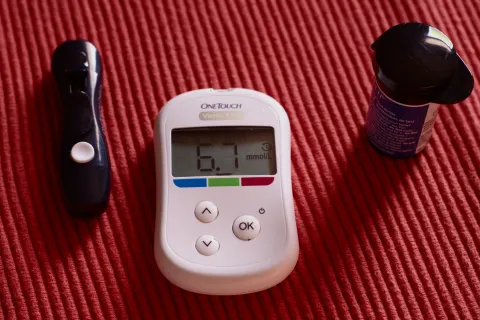Autism and Obesity
By Pediatric Psychologists Wendy Ward and Elizabeth PulliamThis week’s “Food for Thought” answer is by pediatric psychologists Wendy Ward and Elizabeth Pulliam. Both practice at the University of Arkansas for Medical Sciences and Arkansas Children's Hospital. The university and medical center are part of the Autism Speaks Autism Treatment Network (ATN). Dr. Pulliam co-authored the Autism Speaks ATN/AIR-P tool kit: Exploring Feeding Behavior in in Autism: A Guide for Parents.
Our 8-year-old has autism and is minimally verbal. His problem is knowing when to stop eating. He’s 4 foot 4 and 125 pounds with a 35-inch waist. We tried giving him smaller portions on a smaller plate. Doesn’t work. He’s very active and exercises – playing basketball, running, swimming and just playing. But he’s still gaining weight. We eat a very healthy diet, no junk food. I don’t know what to do. I’m afraid he’s going to drop dead of a heart attack.
Editor’s note: The following information is not meant to diagnose or treat and should not take the place of personal consultation, as appropriate, with a qualified healthcare professional and/or behavioral therapist.
Thank you for reaching out. The issues you describe are shared by so many families with loved ones on the autism spectrum. Helping children adopt healthy eating behaviors is a struggle for many parents, and developmental challenges can add to the difficulty. Last year, research by the U.S. Centers for Disease Control found that nearly a third of children with autism are severely overweight, compared to 13 percent of typically developing children.
Research has found several factors that contribute to the problem. They include a tendency for reduced physical activity and poor nutrition. In addition, weight gain can result as a side effect of certain behavioral medicines. We know that parents and other caregivers need guidance to understand and respond to these complex issues.
It’s good to hear that your son is physically active and provided with plenty of healthy food options in your home. At the same time, you’re right to be concerned.
By your measurements, your son has a body mass index (BMI) of 32.5. This is above the 99th percentile for boys his age. BMI does not tell the whole story. However, it can be a general indicator of risk for serious, weight-related medical problems affecting the heart, lung and liver.
A team approach to treating obesity in autistic children
Helping a child on the spectrum with weight issues is complex. So we urge you to seek professional support in tackling the issue. Patients over the 95th percentile are often seen in a multi-specialty weight treatment clinic. The care team typically includes a physician, specialty nurse, dietician, physical activity specialist and psychologist.
We would recommend a team that has special training to work with overweight youth, including those with developmental challenges. Many children’s hospitals have excellent weight-management programs.
- The physician in the team can evaluate your son for possible metabolic conditions and weight-related side effects from medications. We know that certain behavioral medications such as antipsychotics (e.g. Risperdal) and antidepressants can interfere with knowing when one is “full.” As a result, these medications frequently have the side effect of weight gain. The doctor can discuss possible alternatives to these medicines.
- In addition, the doctor can evaluate for hyperphagia. This medical term describes intense feelings of hunger that don’t go away even after eating a large amount of food. Some research has suggested that this may results from hormonal imbalance.
- The dietician on the team can help design an eating plan for your son. He or she can help you understand how much food and what kinds of food your son needs. It sounds like you are already off to a good start with healthful food choices for your entire family.
- The psychologist on the team can identify and address eating-related behavioral issues. Examples include impulsive eating, eating-related rituals, refusal to stop eating, sneaking food and so on. The psychologist can help you develop a strong plan for responding to your son’s problem behaviors. This often includes setting and enforcing clear limits.
- The psychologist can also work with your son to improve his hunger awareness. Hunger awareness is the ability to know when you are becoming hungry and need to eat. It is equally important in realizing when you are full and need to stop.
- Many children with developmental and/or sensory issues struggle with hunger awareness. It really is another type of inner “sense.”
Strategies to try at home
Here are a few strategies you can try at home:
- Engage your son’s interest in another activity as soon as he finishes the meal portion you’ve given him. Get him focused on something besides food!
- Consistently reward appropriate eating behaviors. But avoid using food as the reward. Choose something else that your son enjoys.
- Keep food out of your son’s sight and reach.
- In our practice, we use a visual chart called the Hunger Awareness Scale to remind children to think about their level of hunger and to distinguish hunger from other needs such as the need for stimulation or attention. (Click on the title link to see and download the full-size scale.)
- Provide regularly scheduled meals and snacks with enough time in between for your son’s stomach to empty. We’ve learned that snacking throughout the day decreases hunger awareness. In other words, having food in the belly throughout the day can keep your son from experiencing the feeling of hunger that he needs to recognize.
None of these strategies are quick fixes. Again, we want to emphasize that it’s important to work with health professionals experienced with these issues.
The importance of sleep
It’s also important to make sure your son gets enough sleep. We know from research that sleep deprivation can increase production of brain hormones that reduce hunger awareness.
Unfortunately sleep disturbances are another common health issue for both children and adults with autism. For helpful strategies, we recommend the Autism Speaks ATN/AIR Sleep Tool Kits – one for young children and a second one for teens.
It’s okay to say “no”
As parents, it’s natural for us to want to feed our children when they say they are hungry. However, children with poor hunger awareness or hyperphagia often ask for more food than they need.
So continue to place a healthy combination of carbohydrates, protein, fruit and vegetables on your son’s plate – in a healthy amount. Then, say “no,” to seconds.
As we mentioned earlier, it’s also helpful to eat on a schedule. A visual schedule can help your son keep track. If he asks for food in between scheduled meals and snacks, reply along the lines of:
“I’m sorry. It’s not time to eat yet. Our next meal is in 30 minutes.” Then offer praise for acceptance of your rule and ignore or redirect his attention if he continues to fuss.
Smarter food choices
While your family eats a healthy diet, it can help to increase the proportion of foods that have lower fat content and do a better job of helping your son feel full. These foods include fruits, vegetables and lean protein.
It’s so wonderful that your son enjoys being physically active. We hope you’ll continue to encourage your son to engage in at least an hour of vigorous physical activity each day. Some children need this broken down into a couple of periods of vigorous activity a day, until they can handle a full hour
Thanks again for your question.








